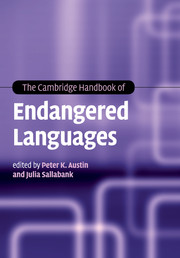Book contents
- The Cambridge Handbook of Endangered Languages
- Series page
- The Cambridge Handbook of Endangered Languages
- Copyright page
- Contents
- Figures
- Tables
- Contributors
- Acknowledgements
- 1 Introduction
- Part 1 Endangered languages
- 2 Language ecology and endangerment
- 3 Speakers and communities
- 4 A survey of language endangerment
- 5 Language contact and change in endangered languages
- 6 Structural aspects of language endangerment
- 7 Language and culture
- 8 Language and society
- Part II Language documentation
- Part III Responses
- Part IV Challenges
- References
- Index of language names
- Index
5 - Language contact and change in endangered languages
from Part 1 - Endangered languages
Published online by Cambridge University Press: 05 June 2012
- The Cambridge Handbook of Endangered Languages
- Series page
- The Cambridge Handbook of Endangered Languages
- Copyright page
- Contents
- Figures
- Tables
- Contributors
- Acknowledgements
- 1 Introduction
- Part 1 Endangered languages
- 2 Language ecology and endangerment
- 3 Speakers and communities
- 4 A survey of language endangerment
- 5 Language contact and change in endangered languages
- 6 Structural aspects of language endangerment
- 7 Language and culture
- 8 Language and society
- Part II Language documentation
- Part III Responses
- Part IV Challenges
- References
- Index of language names
- Index
Summary
- Type
- Chapter
- Information
- The Cambridge Handbook of Endangered Languages , pp. 78 - 99Publisher: Cambridge University PressPrint publication year: 2011
- 13
- Cited by



